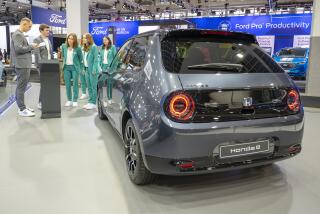Honda Unveils Plans to Sell U.S.-Built Cars in Europe
- Share via
DETROIT — Honda, which already exports thousands of U.S.-built passenger cars back to Japan, announced plans Monday to become the first Japanese auto maker to export American-made cars to Europe as well.
Honda President Tadashi Kume said at a Detroit press conference that Honda will export its Accord station wagon, which is under development, from Honda’s American manufacturing complex in Marysville, Ohio, to Europe, beginning as early as next year.
The Accord wagon will go into production in Ohio this fall and will be available in the American market before it is exported to Europe, added Hiroyuki Yoshino, president of Honda of America Manufacturing, Honda’s U.S. manufacturing arm. However, Yoshino refused to say how many cars will be exported to Europe each year.
Honda’s announcement is likely to intensify a three-way trade controversy that has been simmering among Japan, the United States and the European Community over how Europe will treat imports of products from the United States that are built in factories owned and operated by Japanese firms.
In an effort to skirt stiff EC restrictions that may be imposed on imports directly from Japan once European economic unification becomes a reality in 1992, many Japanese companies hope to export from their new American manufacturing operations instead. Although Honda is the first to announce plans to do so, all of the major Japanese auto makers with American plants have been studying the possibility of exporting to Europe.
But EC officials, fearful that the Japanese will come to dominate the European car market, have so far opposed such transshipments from America. They don’t want to allow a trade loophole that would make a mockery of European restrictions on direct imports from Japan.
In fact, just as Kume was making his announcement Monday, French officials held another press conference in Detroit to denounce the Japanese transshipment strategy. “Europe will face the same Japanese challenge in the 1990s as the United States faced in the ‘80s,” said Jean-Daniel Tordjman, an economic minister in the French Embassy in Washington.
Some European trade officials even consider the Japanese cars built in their new European assembly plants to be imports and want to count them as part of the import allocations the EC has given Japan. Honda builds cars in England through a joint venture with the Rover Group, a British auto maker, while Nissan produces cars on its own in Britain. Toyota is building an assembly plant in England.
But the Bush Administration has so far supported the Japanese and has tried to persuade the Europeans that the Japanese cars built in the United States are American products. A number of Japanese auto makers are already exporting to Japan and Taiwan from their U.S. plants, and the Bush Administration figures that more exports will mean even more American jobs.
“We believe that these are American cars even if they have Japanese nameplates on them,” said a spokeswoman for the U.S. trade representative’s office in Washington.
Further complicating the debate is the increasingly tangled alliances between the major Japanese and American auto makers. For instance, Ford now exports its sporty Probe from the United States to Switzerland, yet the Probe is built in Mazda’s plant in Michigan on the same assembly line that produces Mazda cars that are sold in the United States and Taiwan.





